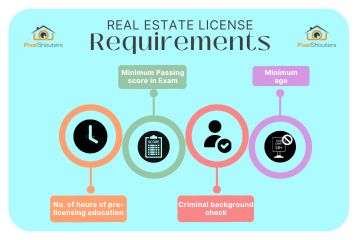How to Get a Real Estate License: Guide for Aspiring Agents
Real estate is a dynamic and ever-changing industry. If you’re interested in starting a career in real estate, the first step is to obtain a real estate license. A real estate license is a requirement in every state to legally sell or lease real estate. It not only opens the door to a fulfilling career but also provides the opportunity to make a substantial income. In this article, we’ll walk you through the steps you need to take to get your real estate license and provide you with helpful tips and advice to make the process smoother.
Table of Contents
1. Research Your State’s Requirements
The criteria for obtaining a real estate license vary by state. The first step to getting your license is to research the requirements in your state. The requirements vary from state to state, so it’s important to know what your state’s requirements are before you begin the process.
To research your state’s requirements, start by visiting your state’s real estate commission website. The website will provide you with information on The requirements for obtaining a real estate license differ by state. Some of the information you’ll find on the website includes:
- Education requirements: The number of hours of pre-licensing education required in your state.
- Age requirements: The minimum age required to obtain a real estate license in your state.
- Exam requirements: The type of exam required in your state and the passing score.
- Background check requirements: Whether a criminal background check is required in your state.

Make sure you thoroughly read through the requirements to ensure you meet all the qualifications before proceeding with the next step.
2. Meet Pre-Licensing Education Requirements
Once you’ve researched your state’s requirements, the next step is to meet the pre-licensing education requirements. Each state requires a specific number of hours of pre-licensing education, which usually ranges from 60 to 120 hours.
There are different types of pre-licensing courses available, such as classroom courses, online courses, and hybrid courses. Classroom courses are held in a physical classroom setting, while online courses are taken entirely online. Online and classroom instruction are combined in hybrid courses.
When choosing a pre-licensing course, it’s important to consider the type of learner you are. If you prefer face-to-face interaction with instructors and peers, a classroom course may be the best option for you. If you’re self-motivated and prefer to learn at your own pace, an online course may be a better fit.
It’s also important to choose a course provider that is approved by your state’s real estate commission. Approved course providers will ensure that the course meets your state’s requirements and covers all the necessary topics.
Once you’ve completed your pre-licensing education, you’ll receive a certificate of completion. When you apply for your real estate license, you will need to present this certificate.
3. Pass the State Licensing Exam
After completing your pre-licensing education, the next step is to pass the state licensing exam. Your understanding of real estate laws, practices, and principles will be tested in the exam.
National and state-specific elements make up the exam. The national portion covers general real estate principles and practices, while the state-specific portion covers laws and regulations specific to your state.
To prepare for the exam, you’ll need to study and review the material covered in your pre-licensing education. You can also find exam prep materials online or through your course provider.

On the day of the exam, arrive early and make sure you have all the necessary documents, such as your certificate of completion and a government-issued ID. The exam is usually taken on a computer and consists of multiple-choice questions
Once you’ve completed the exam, you’ll receive your results immediately. If you pass, you’ll be given instructions on how to apply for your real estate license. If you don’t pass, you’ll have the opportunity to retake the exam after a certain period of time, usually a few weeks.
4. Apply for Your Real Estate License
Once you’ve passed the state licensing exam, the next step is to apply for your real estate license. The application process varies from state to state but usually involves submitting an application and paying a fee.
In addition to the application and fee, you’ll need to provide proof of completing your pre-licensing education and passing the state licensing exam. You may also be subjected to a criminal history check. After your application is approved, you’ll receive your real estate license.
5. Choose a Brokerage
As a licensed real estate agent, you can’t work independently. You must work for an authorized real estate broker. A real estate broker is a licensed professional who oversees real estate agents and their transactions.
When choosing a brokerage, it’s important to consider factors such as reputation, commission split, training and support, and company culture. Research different brokerages in your area and interview a few before making a decision.
6. Build Your Business
Once you’ve chosen a brokerage, it’s time to start building your real estate business. This involves networking, marketing, and building relationships with clients.

- Networking: Networking is important in any industry, but it’s especially important in real estate. Attend industry events, join local real estate organizations, and connect with other professionals in the industry.
- Marketing: Marketing is also key to building your real estate business. The requirements for obtaining a real estate license differ from one state to the next. Consider running ads on social media or in local publications to reach a wider audience.
- building relationships: Finally, building relationships with clients is crucial to your success as a real estate agent. Provide excellent customer service, be responsive to their needs, and build trust with them over time.
Conclusion
Obtaining a real estate license is a challenging but rewarding process. By researching your state’s requirements, meeting pre-licensing education requirements, passing the state licensing exam, applying for your real estate license, choosing a brokerage, and building your business, you can start a successful career in real estate. Remember to stay current with industry trends and regulations, and never stop learning and growing as a real estate professional. Good luck!
